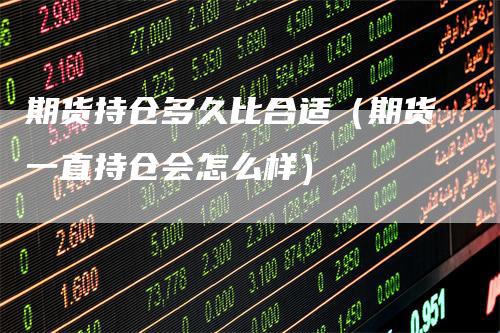
What is the optimal duration for holding futures positions?
Investors often wonder how long they should hold their futures positions before closing them. While there is no one-size-fits-all answer to this question, there are several factors to consider when determining the optimal duration for holding futures positions.
How does holding futures positions for an extended period affect investors?
When holding onto futures positions for an extended period, investors expose themselves to various risks and uncertainties. These risks include market volatility, changes in supply and demand, geopolitical events, and economic factors. Additionally, holding positions for a long time may tie up capital and limit other investment opportunities.
Short-term vs. long-term trading strategies
Some investors prefer short-term trading strategies, where they open and close positions within a few days or weeks. These strategies are based on taking advantage of short-term market fluctuations and require frequent monitoring and active decision-making. On the other hand, long-term trading strategies involve holding positions for months or even years, aiming to profit from broader market trends.
The impact of market trends on holding futures positions
The duration for holding futures positions often depends on the prevailing market trends. If a market is experiencing a strong upward trend, investors may choose to hold their positions for an extended period to maximize profits. Similarly, during a downtrend, investors may decide to close their positions quickly to limit losses and avoid further erosion of capital.
The importance of risk management
Regardless of the duration for holding futures positions, risk management should always be a priority. Investors should set stop-loss orders to limit potential losses and protect their capital. Proper risk management techniques can help investors make informed decisions and minimize the impact of adverse market movements.
Considerations for specific futures markets
Different futures markets may have specific characteristics that affect the optimal duration for holding positions. For example, agricultural futures may have seasonal factors that influence supply and demand, and holding positions for longer periods may be more beneficial. On the other hand, futures markets affected by geopolitical events or government announcements may require shorter-term strategies due to increased volatility and uncertainty.
Conclusion
The optimal duration for holding futures positions is subjective and depends on various factors such as individual trading strategies, market trends, risk appetite, and specific market characteristics. As an investor, it is crucial to regularly assess market conditions and adjust your holding period accordingly. By employing proper risk management techniques and staying informed about the market, you can make more informed decisions about the duration for holding your futures positions.
 微信扫一扫打赏
微信扫一扫打赏
 支付宝扫一扫打赏
支付宝扫一扫打赏





